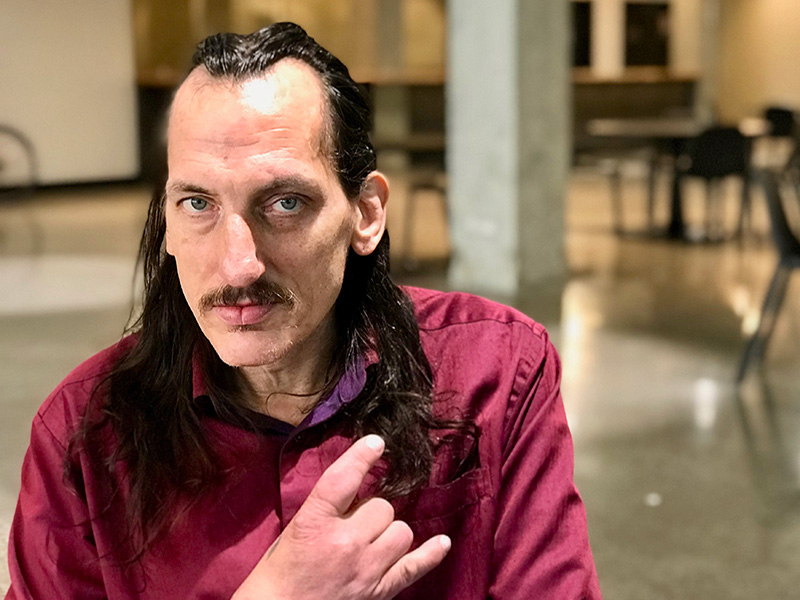Before Gerald “Spike” Peachey was able to access prescription heroin, he said he had worn his “damaged body down to such a weakened state that it was clear to me that to continue for much longer would definitely be the end of me.”
Trey Helten remembers Spike from that time, when they were both homeless and living at the New Fountain Shelter at Abbott and Cordova streets. Helten said Spike would work relentlessly, looking through dumpsters for cans and stuff he could resell to make money to buy drugs.
He pushed an enormous cart that Helten remembers being as big as a car, filled with things he had found and planned to refurbish.
The hard labour took a toll on Spike’s body. “His hands were like knotted wood from so many cuts and abrasions from digging through dumpsters frantically to find something he could refurbish,” said Helten, who today is the manager of the Overdose Prevention Society.
In 2011, Spike was able to get a place in a clinical trial that tested giving prescription heroin and hydromorphone to people with heroin addictions. That experience changed his life, and he never stopped talking about it.
“SALOME saved my life!!” Spike wrote in Megaphone magazine in 2016, referring to the name of the clinical trial run by Providence Health Care at Crosstown Clinic.
“Once I joined the study, for the first time in months I was able to take it easy. I was able to breathe! I was so run down by this point that I suffered a minor stroke two days after entering SALOME. I can’t imagine surviving that if I wasn’t able to take the rest that being part of SALOME allowed. Having my medication being properly prescribed for me was a life-saving relief!”
Spike ran for city council in 2018. He often took people on tours of the Downtown Eastside, and he talked to nursing students and other professionals about how people who use drugs face so much stigma when they try to get help for their pain.
Spike died earlier this week at the age of 55. He’s being remembered as a constant advocate for stopping the stigma that people who use drugs face, and for measures like safe supply (prescription drugs that are prescribed to people with a substance use disorder as an alternative to tainted street drugs).
“He would always be up for coming up with new ideas on how to help educate people about the overdose crisis,” said Sarah Blyth, a co-founder of the Overdose Prevention Society. When the first overdose prevention site started in Vancouver in 2016, Spike was one of the first volunteers, Blyth said.
Blyth also ran for city council in the 2018 civic election. During the campaign, Blyth said, she and Spike would go “around to different communities, and he just talked about the overdose crisis. And some of the challenges that people faced.” Spike was always able to get through to people, Blyth said.
Hearing Spike talk about the stigma that drug users face in the health-care system changed Quincy Batson’s career trajectory. Spike spoke to Batson’s student nursing class at the University of British Columbia in 2019, telling the story of how he’d been horribly injured in a car accident in 2007, then was suddenly cut off from the powerful prescription opioids he had been prescribed for the pain.
“I know of a great many people that have either found their way into addiction, or found their way back into addiction in this manner,” Spike wrote in Megaphone magazine in 2016.
“After a serious injury they are prescribed high doses of narcotics for a period of time. And when the narcotics run out, they are left with a habit.... No matter where I went, I had been labelled as ‘drug seeking.’ Of course I was drug seeking. I needed narcotics to kill my pain. I was also heavily addicted.”
Batson said it was “eye-opening” to hear how Spike had been treated when he tried to access health care, and it’s something she’s carried with her as she started work as a nurse at the urban health unit at St. Paul’s Hospital.
“Anytime I have a patient who says that they are experiencing pain, that is 100-per-cent accurate,” Batson said. “You don’t second guess their experience.”
Spike’s message has never been more important: illicit drugs have become more and more dangerous the longer the COVID-19 pandemic has continued, and despite a soaring death toll, governments have been slow to act when it comes to expanding safe supply.
Blyth said she’ll remember Spike’s unique ability to connect with people and his compassion.
“He was always really kind and generous with his time, just caring about everybody in the community — and wanting to give people a voice,” she said. ![]()
Read more: Health, Rights + Justice
















Tyee Commenting Guidelines
Comments that violate guidelines risk being deleted, and violations may result in a temporary or permanent user ban. Maintain the spirit of good conversation to stay in the discussion.
*Please note The Tyee is not a forum for spreading misinformation about COVID-19, denying its existence or minimizing its risk to public health.
Do:
Do not: